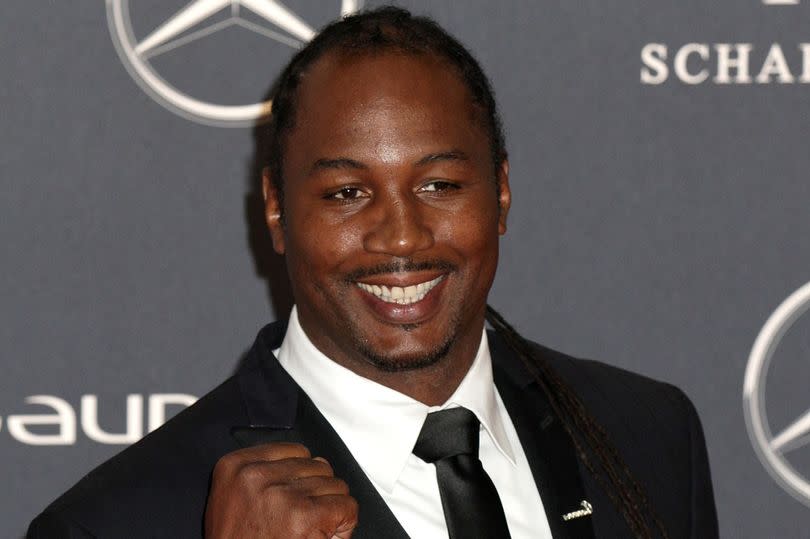Gary Newbon: Ten-hour boxing stint was Oscar material!

The BBC screened one of the great Oscar-winning films in midweek – ‘On The Waterfront’, starring Marlon Brando. It was made in 1954, but it took me back to 1999.
The writer, Budd Schulberg, helped me as part of a ten-hour, non-stop stint covering a world heavyweight title fight for Talksport. The film ranks with the greatest of all time and I was based at the venue, the Thomas and Mack Center in Las Vegas.
The fight was the return between Lennox Lewis and Evander Holyfield on November 13, 1999, for the WBA, WBC, IBF and vacant WB0 undisputed heavyweight championship.
Although I was part of ITV’s boxing team, I was there as the presenter and interviewer for TalkSport.
The schedule, from start to finish – including the contest and the aftermath – was ten hours, breaking only for the commercials, making it the longest stint of my broadcasting career.
Schulberg was a fascinating character and a great talker. He was an American screenwriter, television producer, sportswriter and novelist.
Born in New York in March 1914, he was 85 when he sat down for over an hour’s conversation with me on air. He died ten years later aged 95.
Budd was a great fight fan and wrote the 1947 novel that was turned into a screenplay for ‘The Harder they Fall’ in 1956 – a boxing-themed film starring Humphrey Bogart and Rod Steiger that received an Oscar nomination. It was an unwell Bogie’s last film.
I was a fan of both films, but Schulberg had more involvement with ‘On the Waterfront’, which I’ve watched many times.
We talked about the plot. Marlon Brando giving one of the great film performances as Terry Malloy, a washed up boxer, now a dock worker, who came up with the famous line “coulda been a contender”. It’s really a tale of union corruption and mob informers. The film was full of violence among longshoremen on the waterfronts of Hoboken in New Jersey.
The supporting cast included Karl Malden, Lee J Cobb, Steiger and Eva Marie Saint, and the music was composed by Leonard Bernstein. It cost $910,000 to make and the box office grossed $9.6 million. It won eight Oscars, including best actor for Brando, who picked up many other awards for his portrayal.
But back to 1999. I interviewed anyone of boxing note as we approached fight time. It was a bit of a relief to reach the actual contest and hand over to the commentary team. Britain’s Lewis won this return by a unanimous decision – 115-113, 116-112 and 117-11 – to become the first undisputed world heavyweight champion in nearly seven years.
I’d back Lewis, by the way – when he was at his peak – to beat any of the current world heavyweights, including Tyson Fury and Anthony Joshua. Lewis is 6ft 5ins and was the WBC champ at the time.
I’d covered the first meeting earlier in the same year on March 13 at Madison Square Garden in New York – one of the most famous and greatest boxing arenas, which also hosts other sports. The three main titles were on the line then for the undisputed title and it went all 12 rounds. Again I was there for Talksport.
Most of us expected the verdict to go to Lewis but the three judges between them came up with one of the most controversial decisions of a split draw.
Judge Stanley Christodoulou of South Africa – a fine referee in his time – had Lewis the winner 116-113. The American lady, Eugenia Williams, had it 115-113 to Holyfield, while Britain’s Larry O’Connell scored the fight a draw.
The decision was met with booing from the spectators while Lewis and his corner stood in disbelief, as I did! Former world champion George Foreman described it as a travesty and a shame.
Most of the blame was aimed at the female judge, Williams, who said later that after reviewing the fight she could have called it a draw. The sanctioning bodies soon ordered a rematch – hence the second fight in Las Vegas.
Chris Eubank was the co-commentator and pundit with me at ringside. He was cutting his arrival very fine before we went on air and the ‘boss’, Moz Dee, was somewhat agitated.
But Eubank made me laugh. His excuse was that he was seeking a make-up artist.
I did try to calm things down, pointing out that we were radio for this night, not TV!
My relationship with Lewis was slightly tense in those days because I’d seen him win Olympic gold in Seoul for Canada, and he’d lived in Jamaica and the USA for many years.
He was born in England and left when he was young, so in fairness he was British, although it affected my view of him.
We made it up in time and these days we get on very well.
He gave me a brilliant one-hour interview for my Sky Sports series ‘Sporting Heroes’, during the time of the London Olympics, and asked for Sky’s permission to use it on his website as he rated it one of the best he had done.

 Yahoo News
Yahoo News 
